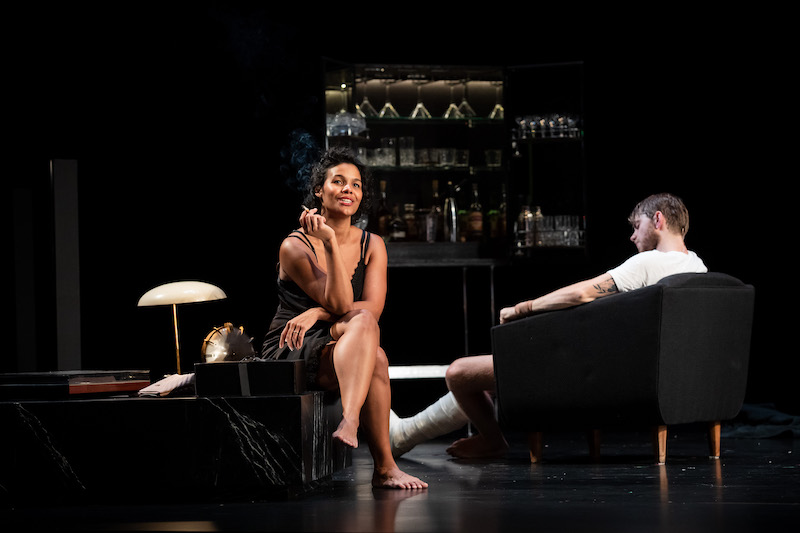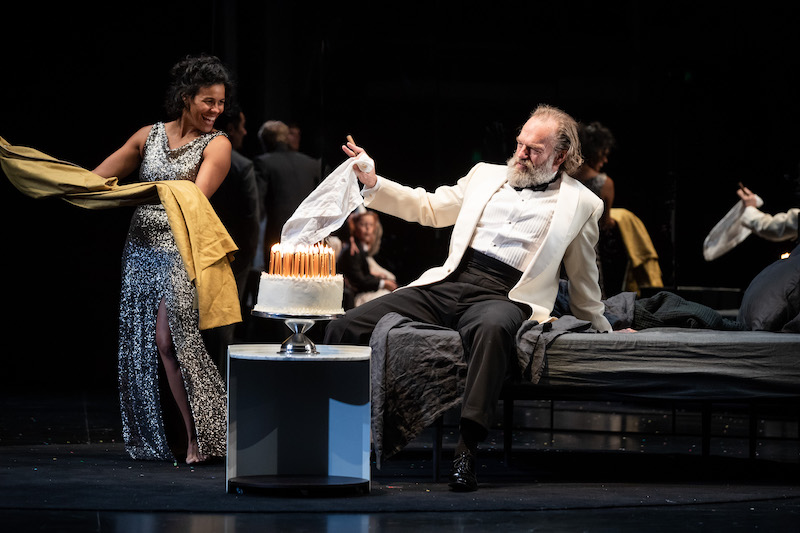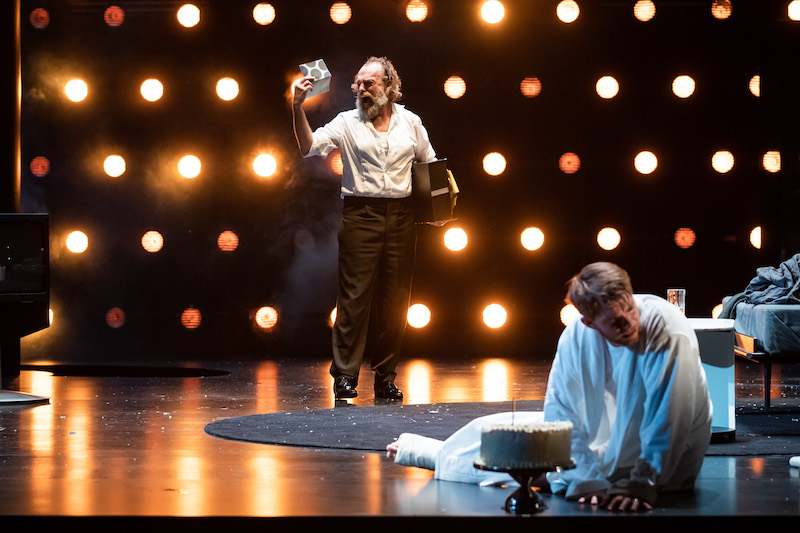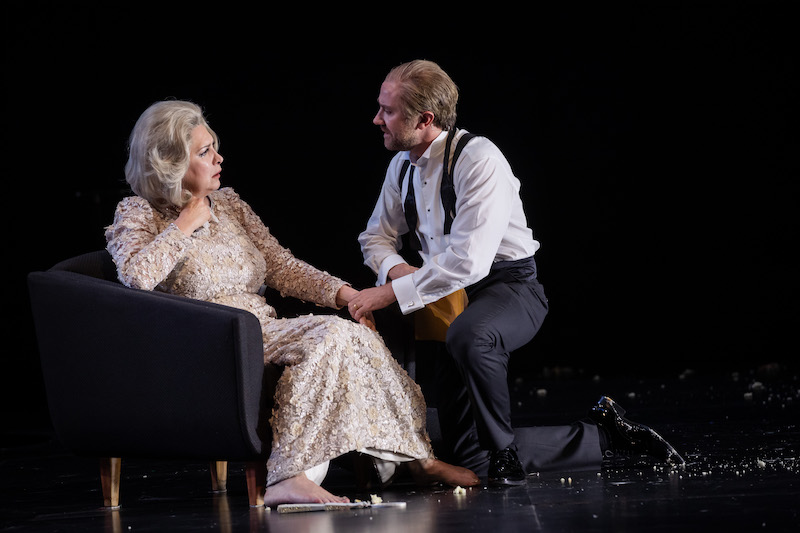As the house goes dark, the strains of Cry Me a River ring out and the lights focus on Zahra Newman standing at the front of the stage, singing sensuously in a glittery black cocktail dress. It’s an arresting start to Tennessee Williams’ masterly 1955 play, and a fascinating prelude to Newman’s dazzling performance as Williams’ frustrated yet tenacious “cat on a hot tin roof” Maggie.
 Zahra Newman and Harry Greenwood. Photograph © Daniel Boud
Zahra Newman and Harry Greenwood. Photograph © Daniel Boud
Hugo Weaving also gives a towering portrayal of Big Daddy, but the production itself slips between various styles that don’t quite gel, with distracting elements undercutting the emotional impact, despite many wonderful moments.
Sydney Theatre Company Artistic Director Kip Williams, who helms the production, explains in the theatre program that he was drawn to Cat on a Hot Tin Roof because of the way it explores ideas around truth, mendacity and deception. At a time when “alternative facts”, “fake news” and overt, shameless lying by politicians, among others, proliferate, the play’s themes – which also include greed and sexual repression – do indeed feel particularly relevant.
Cat on a Hot Tin Roof premiered on Broadway in 1955, winning the Pulitzer Prize for Drama. Set on a plantation in the Mississippi Delta, the intense, three-act, family drama takes place over the course of one evening in the home of self-made, wealthy cotton tycoon Big Daddy Pollitt (Weaving). The family is holding a party to celebrate his 65th birthday and his apparent clean bill of health, after being checked at a clinic. In fact, all the family – except Big Daddy and Big Mama (Pamela Rabe) – know that he is dying of cancer, which has spread through his body.
Their son Brick (Harry Greenwood, Weaving’s real-life son), once a golden boy and football hero, is depressed and drinking heavily after the suicide of his close friend Skipper. What’s more, he won’t sleep with his wife Maggie, which is causing plenty of friction between them. While Brick withdraws into himself and his bottles of booze, his older brother Gooper (Josh McConville) and his wife Mae (Nikki Shiels), who is pregnant with her sixth child, have their eye on Big Daddy’s inheritance.
 Zahra Newman and Hugo Weaving. Photograph © Daniel Boud
Zahra Newman and Hugo Weaving. Photograph © Daniel Boud
Williams and his designers – David Fleischer (set), Mel Page (costumes) and Nick Schlieper (lights) – have maintained the Mississippi setting and the southern drawl (though some of the actors’ accents waver at times), for which Tennessee Williams shaped his use of language. (In a previous Sydney production which used Australian accents, the Aussie way of speaking sat oddly with the rhythm of the words).
As Kip Williams points out in the program, when the play premiered, the 1950s setting represented the modern day for the audience, so here the staging is contemporary and chic with built-in, mirrored wardrobes and a flat screen television, though the furniture chosen also dates back to the 1950s (a vintage drinks cabinet, for instance) capturing the tradition of the world within which the characters live.
The play is staged in a large room with the walls missing so that we see through the room to a passageway behind where there is a small table with a phone. There is also a large, dark column where stairs disappear to a floor below. Williams uses the vast space cleverly to show people passing through the house, and eavesdropping on others. It’s all brilliantly illuminated by Schlieper’s stark, industrial lighting and there is a fabulous percussive, jazzy score by Stefan Gregory.
In Act One, set in Brick and Maggie’s sleek bedroom, there is a fair amount of furniture, including a double bed, wardrobes and a shower, and the effect is essentially naturalistic. For the second and third acts the furniture becomes far more minimal creating a more abstract, stylised space where the naturalism feels decidedly heightened – which doesn’t entirely suit the play. Instead of feeling the intensity build within the claustrophobic family setting, the action feels rather far-flung at times.
 Hugo Weaving and Harry Greenwood. Photograph © Daniel Boud
Hugo Weaving and Harry Greenwood. Photograph © Daniel Boud
In the second act, a huge panel of lights covering the back wall is introduced. These flash on at key emotional moments, to the sound of fireworks (which Williams referenced in his script); a rather heavy-handed effect. When Big Mama later asks Reverend Tooker (Peter Carroll) to open the door and let some air in, the panel rises. It comes across like an arch joke and the audience roars with laughter that cuts across the action. In fact, it feels as if the comedy is pushed a tad too far at times, with easy laughs that puncture rather than intensify the building of dramatic tension.
Act One does knock you for six though, with Newman giving a sensational, febrile, whirlwind performance as Maggie. Constantly changing her outfit, as she decides what to wear for the party, she hardly draws breath as she addresses Brick with the hyper, up-beat energy of someone who is putting on a show, and trying to seduce an unresponsive audience – all bright and over-breezy to cover the qualms and anxieties inside. She morphs from vaudevillian to showgirl, sizzles sensuously in her black petticoat, hurls herself in frustration onto the bed, squirts water to illustrate an anecdote, hops frenetically from foot to foot as if she really is standing on a hot tin roof, and tries to calm herself periodically with a few puffs on a cigarette.
As Brick refuses to engage with her, her frustration rises and the emotions boil over. In one quiet moment, left on her own, she gazes into the mirror on the wardrobe (Williams uses the mirrors cleverly and has positioned them at this point to reflect her multiple times) and asks quietly: “Who am I?” – a moment that cuts to the quick. Yet throughout she remains resolute, determined to bring Brick around and give her the child she desperately wants.
In the face of Newman’s intoxicating vivacity, Greenwood’s non-responsive Brick is somewhat overshadowed and comes across as a rather pale figure; a man defeated, broken and constrained, who doesn’t convince as a former athlete, even one gone to seed. Internalising most of his emotion, his outbursts of anger struggle to cut through the maelstrom of energy from Maggie, and later the outsized personality of Weaving’s Big Daddy.
 Pamela Rabe and Josh McConville. Photograph © Daniel Boud
Pamela Rabe and Josh McConville. Photograph © Daniel Boud
Weaving is superb as the gruff, autocratic Big Daddy, exuding a rough impatience and aggression, particularly now that he believes he has a new lease of life and can stop taking orders from others, especially Big Mama on whom he unleashes a withering, brutally unkind attack. And yet he is touchingly solicitous for Brick, accepting of his son’s possible homosexuality, trying hard to help him come to terms with himself. Weaving’s performance fills the stage. He feels truly dangerous at times, while suggesting conflicting emotions within, and genuine concern for Brick.
Dressed in a big, white, lacy evening gown, Pamela Rabe is very funny as Big Mama, fussing around and making merry, yet clearly more aware of what is going on around her than she lets on, while deeply concerned about Big Daddy, despite suffering his verbal slings and arrows.
There is also strong work from Josh McConville as Gooper, who is clearly second-fiddle in his parents’ eyes to Brick, Nikki Shiels as the avaricious, proudly fertile Mae, and Peter Carroll as Reverend Tooker who knows when to beat a hasty retreat.
The production starts in stunning fashion in Act One, but feels like it is falling off the tracks at times in Acts Two and Three, where the vast open performance space and heightened staging works against the intense drama. Nonetheless, the performances of Newman and Weaving are hard to beat.
Cat on a Hot Tin Roof plays at the Roslyn Packer Theatre, Sydney until June 8











Comments
Log in to join the conversation.